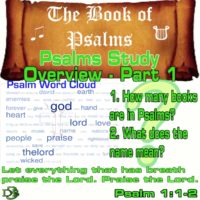

Read: Psalm 1:1-2 ; Psalm 150:6 |
As I prepared this series on the subject of the Book of Psalms, I was surprised by the number of things that I did not know or realize. Thus, I thought it might be fun to compile a “Pop Quiz” to help gauge our understanding of this book of the Bible.
Pop Quiz
1. The Book of Psalms contains how many books within it?
- 150 – There are 150 books and each is considered a book
- 1 – It is called the “Book of Psalms”
- 5 – It is divided into five smaller books
- 7 – It represents the idea of poetic divine completeness and perfection
2. Jesus often quoted Old Testament scripture when He spoke, but He did not mention the Psalms
- True
- False
3. The Book of Psalms and Job are part of the Books of Poetry, which also include Proverbs, Ecclesiastes and the Song of Solomon
- True
- False
4. Approximately ____% of the references in the New Testament to the Old Testament are to the Book of Psalms
- 7%
- 20%
- 50%
- 70%
5. The key word(s) in the Book of Psalms is ________
- Asaph
- Lord
- Praise
- Prayer
- All of the above
No matter how you scored, let us study this book together in order to illuminate the key concepts and lessons found in Psalms. By the end of the study, I trust that neither of us reads the Psalms in the same way ever again! Answers (1c, 2b, 3a, 4c,5c)
Why should I study this Old Testament book?
Many people feel that the New Testament is easier to grasp and understand than some of the books of the Old Testament. However, there are some important considerations to make before we relegate the Old Testament to a “read later” or “read whenever” category.
- 52% of the quotations of the Old Testament found in the New Testament (116 of the 219) come from Psalms
- Psalms foreshadows Christ
- All scripture is given by inspiration of God, and is profitable (2 Timothy 3:16,17; Romans 15:4, 1 Corinthians 10:11)
What’s does the name “Psalm” mean?
Naming a child is an important task. The child will carry this name throughout their lives and represent their lineage good or bad. Over time, their spoken name resonates with those who know the person and causes us to recall their image, their character and their personality.
In the same way, the ageless name for this book of the Bible is also important – Psalm. The Greek word is “psalmos”, from the Hebrew word “zmr” meaning “to pluck”. Plucking involves taking hold of the strings of an instrument with the fingers. The name implies that the psalms were originally composed to be accompanied by a stringed instrument. In fact, in the New Testament Ephesians 5:19 tells us to sing the psalms by plucking the strings of our hearts. In other words, to sing them with emotion.
Who wrote them?
The Psalms were compiled over several centuries. The oldest Psalm is the prayer of Moses (Psalm 90). The latest psalm is most likely Psalm 137 because it was written during the days when the Hebrews were in Babylonian captivity from about 586-538 B.C.
The 150 individual psalms were authored by many different people representing every human emotion. For this reason, the book is often called the book of human emotions.
The authors and the number of chapters penned by each include: David (73), Asaph (12), the sons of Korah (12), Solomon (2), Moses (1), Heman (1), Ethan (1), anonymous (48).
Borrowing and slightly altering Stevie Wonders’ Album Title “Songs in the Key of Life”, the Psalms could be considered “Psalms in the Key of Life”. All of the Psalms are designed to resonate in our hearts and minds and teach us to praise the Lord in every occasion in our lives!
Questions:
1. Discover –
A. How did you do on the Pop Quiz? Are some of these facts new to you?
B. I challenge you to take the time to read with me, every book of the Psalms during this study?
2. Develop –
A. What is your favorite Psalm? Does it “pluck the strings of your heart?
B. Share with us some of your favorite verses from Psalms.
3. Demonstrate –
A. How does your life demonstrate that you have follow the key scriptures Psalm 1:1-2 and Psalm 150:6?
Psalms
Overview – Part 1 – Why, What and Who
Overview – Part 2 – Poetry, Prayer and Power
Part 3 – 5 Books in One
Book 1
Psalm 1
Psalm 2
Psalm 3 and 4
